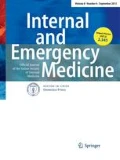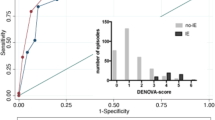Abstract
Procalcitonin (PCT) is known to be a biological diagnostic marker for severe sepsis, or septic shock in critically ill patients. There are still contrasting data about a role of procalcitonin in patients with acute myocardial infarction or cardiogenic shock, and in those with acute coronary syndromes, that is, non-ST-elevation myocardial infarction or unstable angina. We evaluated plasma levels of procalcitonin and C-reactive protein (CRP) in 52 patients admitted to our intensive cardiac care unit (ICCU): 14 patients with cardiogenic shock (CS) following ST-elevation myocardial infarction (STEMI), 15 patients with uncomplicated ST-elevation myocardial infarction (STEMI), and 24 with non-ST-elevation myocardial infarction or unstable angina (NSTEMI/UA). In all patients, infective processes were excluded. Procalcitonin values were significantly higher in CS patients with respect to the other two subgroups (P < 0.001, P < 0.001) while CRP levels were higher than NSTEMI/UA patients (P < 0.001) but not with respect to STEMI patients (P = 0.063). No correlations were found in cardiogenic shock patients between CRP and PCT values (R = 0.02; P = 0.762, ns). Procalcitonin levels measured on ICCU admission are significantly higher in patients with cardiogenic shock following the acute myocardial infarction, and they are not correlated with those of CRP. The degree of myocardial ischemia (clinically indicated by the whole spectrum of ACS, from unstable angina to cardiogenic shock ST-elevation following myocardial infarction) and the related inflammatory-induced response are better reflected by CRP (which was positive in most acute cardiac care patients of all our subgroups), than by PCT which seems more reflective of a higher degree of inflammatory activation, being positive only in all CS patients.

Similar content being viewed by others
References
Conlon JM, Grimelius L, Thim L (1988) Structural characterization of a high-molecular-mass form of calcitonin [procalcitonin-(60–116)-peptide] and its corresponding N-terminal flanking peptide [procalcitonin-(1–57)-peptide] in a human medullary thyroid carcinoma. Biochem J. 256:245–250
Uzzan B, Cohen R, Nicolas P, Cucherat M, Perret GY (2006) Procalcitonin as a diagnostic test for sepsis in critically ill adults and after surgery or trauma: a systematic review and meta-analysis. Crit Care Med 34:1996–2003
Geppert A, Steiner A, Delle-Karth G, Heinz G, Huber K (2003) Usefulness of procalcitonin for diagnosing complicating sepsis in patients with cardiogenic shock. Intensive Care Med 29:1384–1389
Kafkas N, Venetsanou K, Patsilinakos S, Voudris V, Antonatos D, Kelesidis K, Baltopoulos G, Maniatis P, Cokkinos DV (2008) Procalcitonin in acute myocardial infarction. Acute Card Care 10:30–36
Remskar M, Horvat M, Hojker S, Noc M (2002) Procalcitonin in patients with acute myocardial infarction. Wien Klin Wochenschr 114:205–210
Buratti T, Ricevuti G, Pechlaner C, Joannidis M, Wiedermann FJ, Gritti D, Herold M, Wiedermann CJ (2001) Plasma levels of procalcitonin and interleukin-6 in IMA. Inflammation 25:97–100
Califf RM, Bengtson JR (1994) Cardiogenic shock. N Engl J Med 330:1724–1730
Holmes DR Jr (2003) Cardiogenic shock: a lethal complication of acute myocardial infarction. Rev Cardiovasc Med 4:131–135 Review
Hochman JS (2003) Cardiogenic shock complicating acute myocardial infarction: expanding the paradigm. Circulation 107:2998–3002
Webb JG, Lowe AM, Sanborn TA et al (2003) Percutaneous coronary intervention for cardiogenic shock in the SHOCK trial: SHOCK Investigators. J Am Coll Cardiol 42:1380–1386
Valente S, Lazzeri C, Vecchio S, Giglioli C, Margheri M, Bernardo P, Comeglio M, Chiocchini S, Gensini GF (2007) Predictors of in-hospital mortality after percutaneous coronary intervention for cardiogenic shock. Int J Cardiol 114:176–182
Valente S, Lazzeri C, Chiostri M, Sori A, Giglioli C, Salvadori C, Gensini GF (2008) Time of onset and outcome of cardiogenic shock in acute coronary syndromes. J Cardiovasc Med (Hagerstown) 9:1235–1240
Thygesen K, Alpert JS, White HD (2007) Joint ESC/ACCF/AHA/WHF Task Force for the Redefinition of Myocardial Infarction, Universal Definition of Myocardial Infarction. J Am Coll Cardiol 50:2173–2195
ACC/AHA (2007) Guidelines for the management of patients with unstable angina/non–ST-elevation myocardial infarction. J Am Coll Cardiol 50:e1–e157
Whicher J, Bienvenu J, Monneret G (2001) Procalcitonin as an acute phase marker. Ann Clin Biochem 38:483–493
Nijsten MW, Olinga P, The TH et al (2000) Procalcitonin behaves as a fast responding acute phase protein in vivo and in vitro. Crit Care Med 28:458–461
Oberhoffer M, Stonans I, Russwurm S et al (1999) Procalcitonin expression in human peripheral blood mononuclear cells and its modulation by lipopolysaccharides and sepsis-related cytokines in vitro. J Lab Clin Med 134:49–55
Sentürk T, Cordan J, Baran I, Ozdemir B, Güllülü S, Aydinlar A, Göral G (2007) Procalcitonin in patients with acute coronary syndrome: correlation with high-sensitive C-reactive protein, prognosis and severity of coronary artery disease. Acta Cardiol 62:135–141
Brunkhorst FM, Clark AL, Forycki ZF, Anker SD (1999) Pyrexia, procalcitonin, immune activation and survival in cardiogenic shock: the potential importance of bacterial translocation. Int J Cardiol 72:3–10
Aouifi A, Piriou V, Bastien O, Blanc P, Bouvier H, Evans R, Célard M, Vandenesch F, Rousson R, Lehot JJ (2000) Usefulness of procalcitonin for diagnosis of infection in cardiac surgical patients. Crit Care Med 28:3171–3176
de Werra I, Jaccard C, Corradin SB, Chioléro R, Yersin B, Gallati H, Assicot M, Bohuon C, Baumgartner JD, Glauser MP, Heumann D (1997) Cytokines, nitrite/nitrate, soluble tumor necrosis factor receptors, and procalcitonin concentrations: comparisons in patients with septic shock, cardiogenic shock, and bacterial pneumonia. Crit Care Med 25:607–613
Conflict of interest statement
The authors declare that they have no conflict of interest related to the publication of this manuscript.
Author information
Authors and Affiliations
Corresponding author
Rights and permissions
About this article
Cite this article
Picariello, C., Lazzeri, C., Chiostri, M. et al. Procalcitonin in patients with acute coronary syndromes and cardiogenic shock submitted to percutaneous coronary intervention. Intern Emerg Med 4, 403–408 (2009). https://doi.org/10.1007/s11739-009-0277-9
Received:
Accepted:
Published:
Issue Date:
DOI: https://doi.org/10.1007/s11739-009-0277-9




